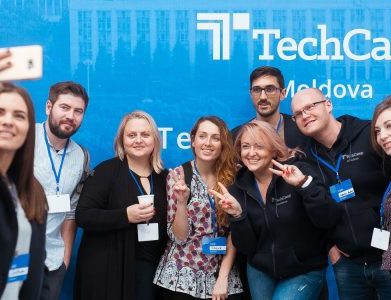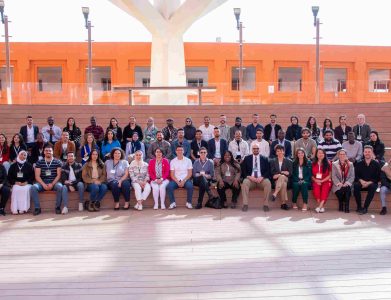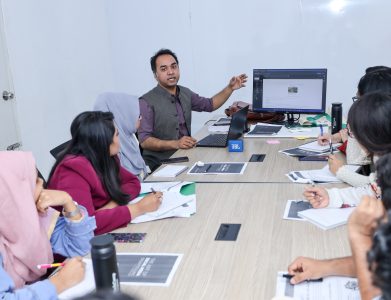This summer, The U.S Department of State’s TechCamp program funded eight exciting projects in six world regions, equipping TechCamp alumni to continue important work in their countries.
Following up on the results of a global survey of all TechCamp alumni and trainers in observance of ten years of TechCamp programming around the world, one of the top requests from alumni was to have more opportunities for funding and continued engagement. This year for the first time, the TechCamp Program launched a global alumni grants opportunity, in partnership with the Bureau of Education and Cultural Affairs (ECA) Office of Alumni Programs’ AEIF Grants!
Through this exciting collaboration, we were able to support eight TechCamp AEIF Grant Projects and have also learned that at least two other TechCamp-affiliated projects have been funded through the general AEIF contest!
Congratulations to all who applied and especially to our winners! The funded proposals are the following:
Côte d’Ivoire: BINKADI 3.0
The BINKADI 3.0 project aims to promote peace and social cohesion during and before the October 2023 elections in Côte d’Ivoire, through fact-checking and by training and sensitizing stakeholders to achieve behavioral change for peaceful and violence-free elections. The challenge of this project is to strengthen the social fabric and promote peace and stability in Ivorian communities. More specifically, it is to fight against misinformation and hate speech, which are the main causes of inter-community tensions during elections in Côte d’Ivoire.
Ethiopia: Co(x)ist
In Ethiopia there is ethnic tension and conflict in many regions. Teaching young people about each ethnic group’s unique culture and having more positive/unbiased information about them will help address the issue of misinformation in the country. This project proposes the use of immersive XR technologies such as virtual environments and augmented reality as a way to teach and share cultural heritage and experiences. Serious role-playing games designed for educational objectives will be a new tool to teach cultural content in an engaging way. By using these technological advancements, students will be immersed in the culture of another ethnicity, allowing them to experience various aspects of that culture, such as wearing cultural clothes, visiting the place, eating a cultural meal together, and enjoying traditional holiday celebrations.
Kosovo: Cybersecurity Awareness through Animated Videos
This project aims to address the need for increased cybersecurity awareness and education among the public, particularly non-technical audiences such as primary and secondary schools, NGOs, businesses, and higher education institutions. The project recognizes the growing threat of cyber-attacks and data breaches, which can result in identity theft and reputational damage for the audience. One main challenge with cybersecurity awareness is that the concepts and technical terminology can be difficult for non-technical audiences to understand. With this project, the organizers aim to present the information in an engaging and accessible way through animated videos, making it easier for people to understand and retain the information.
Mexico: Audiovisual Journalism Training For Human Rights Story Production
This project will train women in audiovisual journalism for human rights story production through the creation of high quality and informative content. The project will include different components including three specialized workshops and three mentorship opportunities that will train Mexican women journalists to translate written journalism stories to an audiovisual format. The team will choose four pairs of TechCamp MX 2021 alumni (one from Mexico City and three from other Mexican states) to improve their audiovisual journalism proficiency from basic to intermediate, through a two-day in-person event in Mexico City, where they will be trained with three specialized workshops. They will also work on researching and recording scripts to produce and edit a short documentary on human rights.
Mongolia: Art for Change: Artist in Residency Project
The Rehabilitation Development Center for Children with Disabilities (RDC) in the capital city of Mongolia, Ulaanbaatar provides comprehensive rehabilitation services to 6,500 children with disabilities annually. However, the RDC lacks a standardized curriculum, training program, and professional instructors and specialists for these rehabilitative services.
The Art for Change project aims to help bridge this gap by collaborating with the center and artists to create a strong platform for an ‘Artist in Residency,’ program which will be the country’s pioneering initiative for delivering social inclusion art programs nationwide, with a particular focus on cerebral palsy.
The project’s training curriculum and guidelines will be used both within and outside the RDC for Children with Disabilities to facilitate the comprehensive development of children with disabilities throughout Mongolia, ultimately leading to the sustainable provision of improved educational and social development support services such as cognitive, socialization, artistic creativity, art therapy, and life skills, thereby enabling children with disabilities to achieve their full potential.
Morocco: Revive the annual socio-cultural festival of Zaouiat Sidi Abdeslam
Reviving the annual socio-cultural festival of Zaouiat Sidi Abdeslam is part of the second phase of the team’s original TechCamp project to preserve the cultural heritage of this tribe. The goals are to enhance the village heritage of Zaouiat Sidi Abdeslam; to grow the festival and strengthen its connection to local cultural heritage and folklore including traditional dance, “Ahidous”; to raise awareness of the heritage of the tribe for the benefit of younger generations in the region in order to highlight the importance of their cultural heritage; and to create digital recordings of various activities of the festival in order to contribute to the enhancement of the cultural heritage of the region.
Nepal: Sipalu Sister: A Platform for Life Skill Learning
For rural illiterate women in Nepal who want to learn how to use tools to be more independent in their day-to-day lives, or make informed decisions, there is a dearth of resources and support. Sipalu Sister (Sipalu means skillful in Nepali) will be an online platform powered by cutting-edge AI recommendation systems, containing instructional how-to videos centered on critical life skills, which will be useful to these women who have limited access to resources and in-person training opportunities. The empowerment of Nepali women through visual training on tool use and other life skills using an online platform will result in decreased dependency on others and increased confidence and proactiveness in home repair, decision making, public discourse, and financial management.
Turkiye: Serious Games for Earthquake Awareness and Preparedness
This project is a direct response to the unprecedented earthquake that occurred in the southeastern region of Turkiye, directly impacting hundreds of thousands of lives and indirectly millions of the country’s citizens. The team will use technology to address the issues of generating awareness of both the impacts of natural disasters and of possible preparedness procedures that can be applied to real-life situations in the future. The project will leverage game design techniques in serious games/game experiences/gamified applications.
We can’t wait to watch these projects grow and make deep impacts in their communities! We will share the outcomes of these exciting projects here on our blog and on our social media channels as we receive progress reports from the project teams. Be sure to follow along for updates and if you are a TechCamp alum who won one of the general AEIF grants, we’d love to hear about your project too. Congratulations again to the selected project teams!


